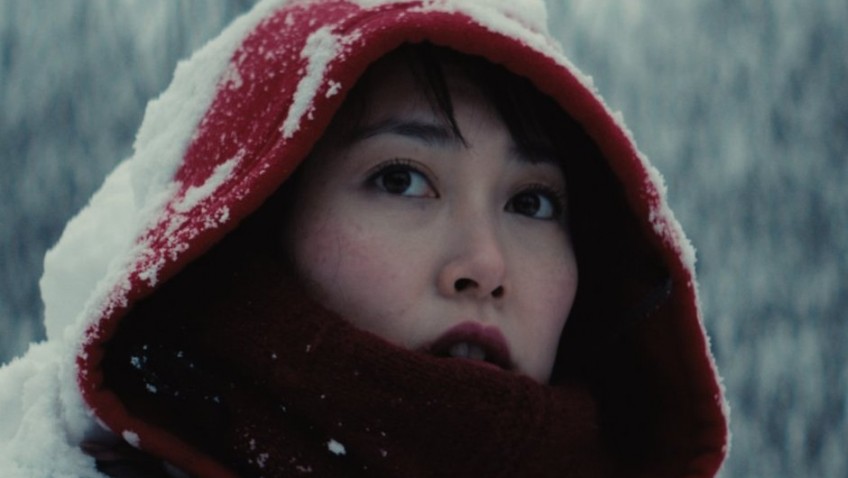Kumiko, the Treasure Hunter is a refreshingly original psychological drama about the liberating power and the danger of fantasy that is nonetheless let down by the filmmakers’ ultra-quirky distortion of a tragic story. The film is essentially a road movie, and is Executive Produced by that master of the Road Movie, Alexander Payne who, sadly, failed to steer Texan brothers David (Director) and Writer (Nathan) Zellner (Kid-Thing, Goliath) onto the right track.
Based more on an urban legend than on the true news story behind it, the film opens with a woman with a map on a winter beach. She enters a cave and, finds a buried VHS that turns out to be the American film, Fargo. The woman, Kumiko (Rinko Kikuchi), is fixated on a scene in which a character buries a satchel of money in a snowy field by a barbed wire fence and she grows obsessed with finding it.
In Tokyo, a city of 35 million people, it is difficult for single, 30-something woman not to feel lonely, particularly after being sacked from her suffocating office job and constantly belittled by a nagging mother. This background alone would have been sufficient to lead to the events of the film as we would understand if Kumiko would suffer a breakdown and seeks to escape her humdrum existence with this treasure fantasy.
But the psychological state of the woman on whose life the film is loosely based was apparently the result of a failed love affair with an American businessman, while the filmmakers make Kumiko so pathologically shy and detached from reality that she appears imbecilic. Her uptight manner and inability to communicate understandably alienate her bullying work colleagues and misogynist boss.
This inability to communicate continues when she arrives in Minnesota, with only the clothes on her back, a hand-made treasure map and a credit card stolen from her company. One has to ask how she even managed to get a job if she cannot realise they would instantly cancel the credit card, leaving her penniless in a foreign country.
Kumiko’s inability to show gratitude or communicate is wrongly attributed to the language barrier by the friendly people who try to help her. These include a lonely old widow (Shirley Venard) who offers Kumiko a hot drink, food and her own room, but refuses, on safety grounds, to drive her to Fargo. Then there is a kind-hearted traffic cop (played by the Director) who buys her warm clothes and boots after failing to convince her that the treasure is not real. The Zellner Brothers seem to be modelling the policeman after the characters in Fargo, only lowering his IQ by such a noteworthy degree that he assumes the proprietor of a Chinese restaurant will understand and speak Japanese.
While the atmosphere and the story are compelling enough to keep us watching, the impact of the tragedy is lost, along with our sympathy for Kumiko whose unfeeling sense of entitlement is not excused by her obsession. The treasure would have made a wonderful symbol for a lonely, shy woman’s quest for self-fulfilment, adventure and happiness if the Zellner Brothers had not made Kumiko more in need of psychiatric treatment.
Rikuchi, Academy Award nominated for Best Supporting Actress in Babel, who also appeared in the 2010 adaptation of Haruki Murakami’s novel, Norwegian Wood, is in every frame of the film, and is uttering convincing, if not necessarily utterly annoying as well.
The Zellner Brothers are less interested in the tragic news item on which their film is based than in exploring an individual’s fantasy life without recourse to reality TV, CGI or Manga characters. It is a shame that they did not treat this fascinating theme without recourse to such quirky characters and a protagonist who is too far gone when we meet her to take us with her on any journey.
Joyce Glasser – MT film reviewer




